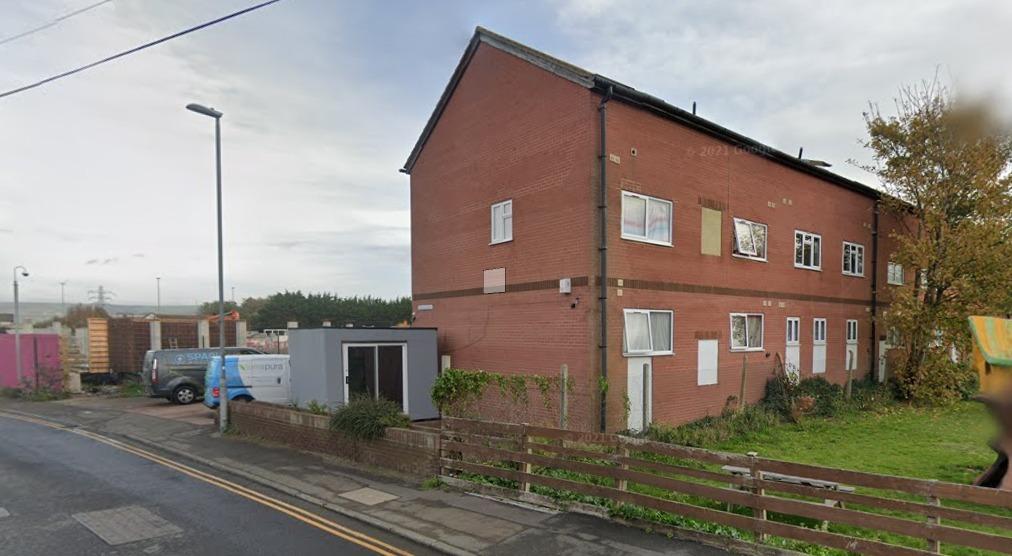What is Temporary Accommodation?
In recent years, homelessness has become a growing issue in many cities and towns around the world, including Brighton and Hove and Sussex. As a result, a number of housing initiatives have been developed to address the issue, including the provision of more in-house emergency housing and longer term temporary accommodation housing for those in need.
One of the primary concerns for those experiencing homelessness is safety and mental health and how this can escalate to further issues, which is why without access to safe and stable housing, individuals may be exposed to a range of health risks, including exposure to the elements if rough sleeping, lack of access to basic sanitation, and increased susceptibility to illness, disease and addiction.
While emergency accommodation and temporary housing should only provide a short-term relief, the reality is often different with many people waiting a long time to gain their forever home. So very much see is as a period in exile essentially from the permanent home you desperately want and need
However you should also be aware, many face significant barriers in securing long-term social housing, private renters are affected by the rising cost of rents, and everyone is affected by the shortage of truly affordable housing, and the issue of section 21 no-fault eviction. Which for many of you, is the very reason you are reading this.
Fortunately, there are resources and support available for those experiencing homelessness in Brighton and Sussex. This includes legal advice from services such as Lawstop and Shelter for those facing eviction, as well as assistance with accessing social housing and other forms of support if you are facing barriers accessing these services from statutory services.
If you are facing homelessness or have been affected by the housing crisis in Brighton and Hove, temporary accommodation can provide a safe and supported environment in the short term. However, it is important to be aware of your rights, the rules in place, and the resources available to you.
What is Temporary Accommodation like?
Temporary accommodation can vary depending on the type of accommodation and the provider. Homeless hostels, B&Bs, and shelters are just a few examples of the types of temporary accommodation that may be available to you. The accommodation may be shared or private, and you may have access to communal facilities such as kitchens and bathrooms.
In-House Emergency & Temporary Accommodation: These are much better quality, the environments are nice and some have welfare officers who work from those locations. But has the lowest amount available, we are campaigning for the council to invest and expand the in-house emergency and temporary accommodation units available.
Private Sector Emergency Accommodation: Sadly the results and quality of these accommodations varies provider to provider. At present the council are not doing room inspections, therefore it’s hard to say what you will face. You should be prepared though, some are ghettos, places you would not like to live due to the fact they are unsupported, there are no support workers in the majority and you will often have very draconian rules, like no visitors allowed, its not uncommon for providers to break the law and enter your home without the required notification which is 24 hours. You are provided Wirth a licence agreement and rules, essentially they can cancel you’re room for ant reason, even if you are at no-fault. Keep your head down, and bid regularly!
Supported Emergency Accommodation:
Supported Accommodation numbers are rapidly increasing in Brighton and Hove, with a mix of third sector and social housing providers providing these accommodations. Some such as William Collier House have shared facilities, these often have “support workers”. Be Aware! just because they are supported does not mean they will not be equally as chaotic or even worse than the private sector unsupported Emergency Accommodation.
SWEP/SHELTER PROVISION:
yes that is right the council are now signposting homeless people to SWEP and Other Night Shelter Provisions in the city, we have evidence they are doing this too people who have a priority need for more stable accommodation, which has its own privacy. Which is a human right people have even people experiencing homelessness.
Out of area placements:
These are becoming more and more prevalent due to the council not planning ahead and having emergency housing capacity they need locally, its not uncommon to be placed in Eastbourne, you will be expected to bring your children to Brighton for Schooling. often with no financial support, many are reporting placed hotels out of area and having to travel back to Brighton and Hove daily.

Temporary Accommodation in Brighton and Sussex
If you are looking for temporary accommodation in Brighton and Sussex then it is important to set your expectations at the beginning, we are living in times where the supply of genuinely affordable homes and rooms in Brighton and Hove and Sussex has become far too expensive.
We have lost a large amount of homes in the city to short-term lets, so this could mean placements initially in private sector chaotic Emergency Accommodation, some are shared homes, others could be with a nice social landlord. Many people in Brighton and Hove with families end up waiting for permanent 3 & 4 Bedroom Homes for years and years, single people tend to get through the system faster.
Brighton and Hove Housing Coalition can always signpost you to advocates and legal support if you face barriers getting access to Temporary Accommodation as well as signpost you to legal firms like Lawstop.
Emergency Accommodation
If you are facing an emergency situation and need immediate accommodation, there are several options available to you. The local council can provide emergency accommodation if you are eligible, and there are also several charities and organisations that provide emergency accommodation and support.
The quality and environments can vary, with some people expected to share, or families living in shared facilities for up to 6 weeks. Hotels are sometimes used, as are local guest houses and hostels, which in Brighton and Hove are mostly privately owned.
There are normally a few options, supported or unsupported. Be careful just because something is called supported, these placements can sometimes be difficult and stressful places to live, with risks due to the large numbers of other people with complex needs you will be living around.
It is not uncommon for local councils to place you out of the area, this happens in Brighton and Hove with goto locations such as Eastbourne, Newhaven and Peacehaven all being popular locations to place people.
Finally being privately owned, it’s important for you to know in Brighton and Hove we have a few providers and if you have been banned from them then an out-of-area placement by Brighton and Hove City Council is very likely.

Do You Have An Emergency, Supported or Temporary Accommodation issue you want to raise?
If so Housing & Homeless you can contact Advocate Daniel Harris would like to know. He is researching the homeless sector locally and has previously experienced homelessness here in the city.
You can also complete Our Action on Homes Big Housing Survey All Feedback is good feedback!
Temporary Accommodation FAQ
There are several housing initiatives available in Brighton and Sussex to help the homeless. These include local council-run services, such as the Housing Options Team, as well as non-profit organisations, such as Just Life, BHT Sussex, ClockTower Sanctuary and local housing associations, Sussex Homeless Support help, the Brighton Unemployment Centre and other food banks to name a few, there are resources and help available of you search online. We can refer you for emergency energy vouchers if you are on PAYG Top-Up Metres and are either on a low income and/or have a disability. Email us form a referral
You can find more information on available housing initiatives by contacting these organisations and recommend checking out social media mutual aid groups, Local Council Discretionary fund and Emmaus for help with good quality second hand stuff for your accommodation.
The rights and rules vary depending on the type of temporary accommodation. For example, emergency accommodation is designed to be a short-term solution and typically has fewer rights and rules than other types of temporary accommodation.
You would typically be under a licence agreement if you are placed into Emergency Accommodation, some types of Temporary Accommodation offer different tenancy rights. Rules in Hostels are brutally enforced, its very important you read and understand these which should be provided when you sign the tenancy agreement before you move in.
You can contact the Brighton and Hove Housing Coalition for more information on your specific rights and rules and if you have and queries.
Emergency accommodation is designed to provide temporary housing for homeless individuals or families in crisis situations. You can access emergency accommodation in Brighton and Sussex through organisations such as the Housing Options Team or the YAC if you are under 26 years old.
It’s important to take safety and health precautions when staying in temporary accommodation. Some steps you can take include locking your door, avoiding risky behaviour or situations, and keeping your living space clean and sanitary. Serious Safety or safeguarding concerns should be reported to emergency services or the local council. You can also report them to Housing advocate and campaigner Daniel Harris or to your local elected councillors and/or MP.
Finding long-term housing when you’re homeless can be a complex process, but there are resources available to help. The Housing Options Team and Brighton and Advice now can provide information and resources for a range of area such as:
- Accommodation
- Eviction and repossession
- Harassment
- Homelessness
- Housing conditions and disrepair
- Neighbour disputes
- Tenancies and licences
- Travellers rights as-well as
Challenge negative Homeless Decisions via Lawstop and Shelter.
Homeless hostels and other types of temporary accommodation can provide shelter and support for homeless individuals or families.
These can be challenging environments to live in particularly if you or the person living in them is vulnerable, many have rules such as no visitors, and they are often visited by emergency services due to incidents, particularly those run by private sector slum landlords. The council-owned in-house accommodation is much nicer.
There are roughly 500 people at any given time living in emergency accommodation hostel type accommodation and you could be there for a few years before you get a placement, in some cases, the council can end a relief duty after 56 days if they find you suitable alternative longer term accommodation.
The Brighton and Hove Housing Coalition can provide information on available types of temporary accommodation in Brighton and Sussex, as well as advice on how to access them.
It is important to be aware of your rights and responsibilities when staying in temporary accommodation. Follow these tips to make your stay safe and comfortable:
- Follow the rules: Temporary accommodation providers have rules in place to ensure the safety and comfort of all guests. It is important to follow these rules, which may include curfews, noise restrictions, and rules about guests and visitors.
- Respect your fellow guests: Homeless hostels and other temporary accommodations are shared spaces, so it is important to respect the privacy and boundaries of your fellow guests. Be considerate of others and try to keep noise levels down, especially at night.
- Keep your belongings safe: Keep your belongings safe when staying in homeless hostels or other temporary accommodations. Keep valuables with you always and consider using a lock to secure your belongings, if possible.
- Stay healthy: Practice good hygiene to avoid getting sick. Use hand sanitiser, wash your hands frequently, and consider bringing your own towels and bedding if possible.
- Be aware of your surroundings: Homeless hostels and other temporary accommodations can be located in unfamiliar areas, so it is important to be aware of your surroundings and take precautions to ensure your safety. Avoid walking alone at night and keep an eye on your belongings when out and about.
- Know where to find help: If you have any problems or concerns while staying in temporary accommodation, know where to find help. Hostel staff and other support workers should be able to assist you with any issues you may have. You may also be able to find additional support and resources through local homeless organisations or charities.
- Seek long-term housing: While temporary accommodation can provide a safe and supported environment in the short term, it is important to seek long-term housing as soon as possible. There are several organisations and initiatives in place to help people who are homeless or at risk of homelessness find permanent housing.
Temporary accommodation can come in various forms, including emergency accommodation, supported housing, and temporary private rentals. Hostels, B&Bs, Storage Container or Pod Homes and hotels can also be used as temporary accommodation.
If you have received a possession order the chances are you will not have a leg to stand on due to the draconian tenancy rights in England and Wales. If you have been served with a Section 21 eviction notice, you can sometimes challenge it by seeking legal advice and representation. You may be able to challenge the eviction on the grounds of unfair treatment, discrimination, or other factors. Lawstop are a good legal service in Brighton and Hove as-well as Acorn the Renters Union and they operate in other locations across England.
There are many organisations in Brighton and Hove that provide support and advice for those facing homelessness. Street Support is a really good app/resource to help you navigate homelessness in Brighton and Hove.
If you have been affected by a section 21 no-fault eviction, you are not alone. This cruel and unfair policy has forced countless families and individuals out of their homes, often with very little notice and no justification. The use of section 21 has been on the rise in recent years, leaving many people feeling powerless and vulnerable.
Brighton and Hove Housing Coalition is committed to fighting against section 21 no-fault evictions and often raise the issue to Councillors, MP’s and local groups like Acorn Renters Union who can provide support to those who have been affected by this policy. We believe that everyone has the right to safe and secure housing, and we will work tirelessly to ensure that this right is upheld.
If you have been served with a section 21 notice, it is important to know your rights. You may be able to challenge the eviction and stay in your home for longer. The law can be complicated, so we recommend seeking legal advice as soon as possible. Our coalition can provide you with information and links to local housing solicitors who can help. Consider Advice Now Section 21 as a resource.
It is also important to seek support from other organisations and groups who can provide practical help and advice.
But we also recognise that we cannot fight this battle alone.
We need the support of our community to effect real change. If you have been affected by section 21 no-fault eviction, or if you are passionate about housing justice, we urge you to get involved with our coalition.
Join us in our fight for safe and secure housing for all.
Together, we can create a brighter future for Brighton and Hove, where everyone has a place to call home.
